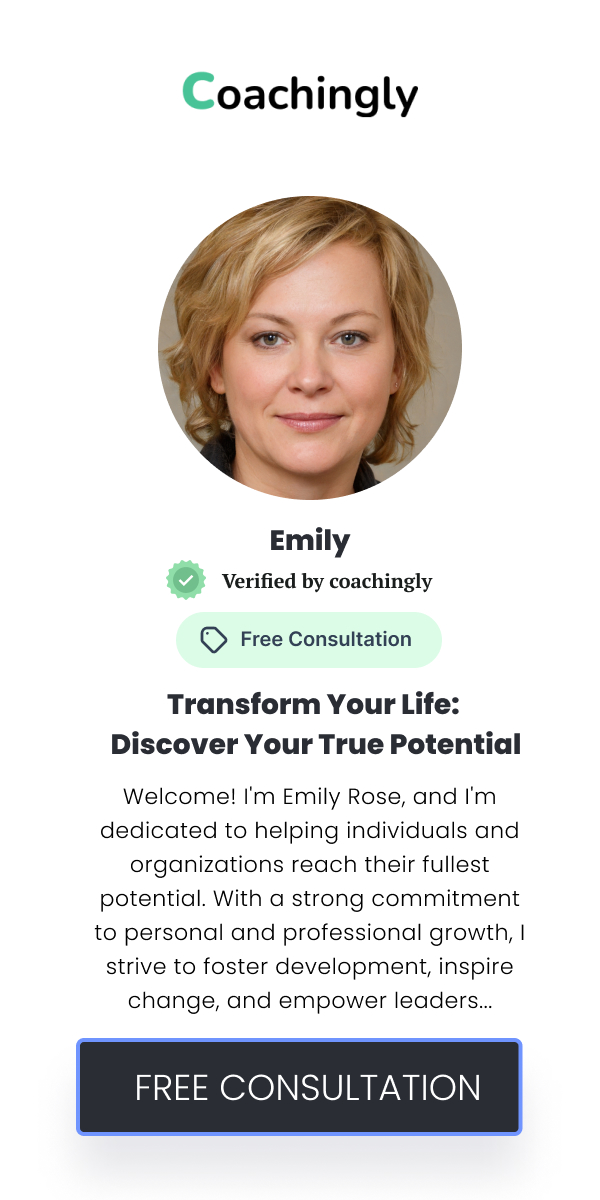
Career Development Strategies: How to Build a Strong Personal Brand and Advance in Your Role
![]() Emily Rose
Emily Rose
![]() July 25, 2024
July 25, 2024
In today's competitive job market, personal branding has become a crucial component of career development. A well-crafted personal brand helps professionals stand out, communicate their unique value, and position themselves effectively within their industry. By defining and promoting what sets you apart, you create a strong presence that attracts opportunities and advances your career. A strong personal brand is not just about self-promotion but about demonstrating authenticity and aligning your professional identity with your values and goals. An Executive Coach can be instrumental in helping you develop and refine this brand, providing insights into how you are perceived and offering guidance on how to project your strengths. Through this process, you will gain clarity on your career objectives and enhance your professional visibility. Building a solid personal brand can lead to increased recognition, more career opportunities, and a greater sense of fulfilment in your role. The first step in building a strong personal brand is to clearly identify your unique value proposition. This involves an honest self-assessment of your skills, experiences, and attributes that differentiate you from others. Start by listing your core competencies, past achievements, and the feedback you've received from peers and supervisors. Reflect on what makes you exceptional in your field and how these qualities can be leveraged to your advantage. An Executive Coach can assist in this self-discovery process by providing tools and frameworks to help you articulate your value proposition effectively. They can also offer an external perspective on your strengths and areas for improvement, helping you refine your professional narrative. Once you have a clear understanding of your unique value, you can communicate it more confidently to potential employers and clients, enhancing your career advancement prospects. With a solid understanding of your unique value proposition, the next step is to build and enhance your personal brand. Craft a compelling personal brand statement that succinctly captures your strengths, goals, and the value you offer. This statement should be reflected consistently across all your professional materials, including your resume, LinkedIn profile, and personal website. Leverage social media and online platforms to showcase your expertise, share relevant content, and engage with industry peers. Networking is another vital aspect of personal branding; by attending industry events and participating in professional groups, you can increase your visibility and establish valuable connections. An Executive Coach can guide you through this branding process, offering advice on how to present yourself effectively and strategies to grow your professional network. Through these efforts, you will enhance your brand’s visibility and credibility, paving the way for career advancement. Setting clear and actionable career goals is essential for advancing in your role and aligning with your personal brand. Start by defining your long-term career objectives and breaking them down into smaller, manageable goals. Develop a strategic plan that outlines the steps required to achieve these objectives, including milestones and deadlines. Regularly assess your progress and adjust your plan as needed to stay on track. Feedback from colleagues and mentors can provide valuable insights into your performance and help refine your goals. An Executive Coach can play a pivotal role in this process, assisting you with goal-setting techniques, providing accountability, and helping you navigate any obstacles. By setting and achieving well-defined goals, you will advance your career and maintain a strong alignment with your personal brand. Continuous skill development is crucial for maintaining a competitive edge and advancing in your career. Identify areas where you need to enhance your skills or acquire new ones to stay relevant in your field. This could involve pursuing additional training, obtaining certifications, or engaging in professional development opportunities. Staying updated with industry trends and best practices ensures that you are equipped to handle evolving challenges and seize new opportunities. Investing in your professional growth not only enhances your personal brand but also demonstrates your commitment to excellence. An Executive Coach can help you identify relevant training programmes and create a development plan tailored to your career goals. By expanding your skill set, you will position yourself as a valuable asset in your industry, opening doors to new career advancements. Building and nurturing professional relationships is integral to career development. Effective networking involves more than just exchanging business cards; it’s about forming meaningful connections with individuals who can support and advocate for your career goals. Attend industry events, join professional associations, and engage in online communities to expand your network. Maintain and strengthen these relationships through regular communication and by offering value to others in your network. Mentorship and partnerships can provide guidance, support, and new opportunities for growth. An Executive Coach can assist in developing effective networking strategies and provide tips on how to cultivate and leverage professional relationships. By actively building and maintaining a robust network, you enhance your career prospects and strengthen your personal brand. Effective career management involves continuously monitoring and evaluating your professional growth. Regularly review your career achievements, challenges, and goals to ensure you are on the right path. Be prepared to adapt to new opportunities and navigate career transitions as they arise. Maintaining a balance between your professional and personal life is essential for long-term success and well-being. An Executive Coach can provide valuable support in managing your career progression, offering strategies to navigate changes and stay motivated. By actively managing your career, you can make informed decisions that align with your personal brand and advance your role within your industry. Adaptability is a key trait for overcoming career challenges and seizing new opportunities. Embrace changes as opportunities for growth rather than setbacks. Developing resilience and a positive mindset can help you navigate obstacles and stay focused on your goals. Mindfulness practices and stress management techniques can be beneficial in maintaining your composure during challenging times. An Executive Coach can offer strategies for managing change and staying motivated, helping you turn challenges into opportunities for advancement. By remaining adaptable and proactive, you will continue to advance in your career and maintain a strong personal brand.The Importance of Personal Branding in Career Development
Identifying Your Unique Value Proposition
Building and Enhancing Your Personal Brand
Setting and Achieving Career Goals
Expanding Your Skill Set and Expertise
Cultivating Professional Relationships and Building a Network
Managing Your Career Progression
Adapting to Changes and Challenges

Recent Articles
Unlocking Leadership Potential: How Executive Coaching Can Transform Your Career
Understanding Executive Coachi...
![]() Aug 01, 2024
Aug 01, 2024
The Power of Authentic Leadership: Developing Your Unique Leadership Style
Understanding Authentic Leader...
![]() Jul 31, 2024
Jul 31, 2024
Navigating Career Transitions: Strategies for a Successful Move to a New Industry
Understanding Career Transitio...
![]() Jul 30, 2024
Jul 30, 2024
Building High-Performing Teams: Leadership Coaching Tips for Effective Team Management
Creating high-performing teams...
![]() Jul 29, 2024
Jul 29, 2024
Mastering Executive Presence: Techniques to Enhance Your Communication and Public Speaking Skills
In today's competitive profess...
![]() Jul 28, 2024
Jul 28, 2024
Emotional Intelligence in Leadership: Why Self-Awareness and Empathy Matter
The Role of Emotional Intellig...
![]() Jul 27, 2024
Jul 27, 2024
Stress Management for Leaders: Mindfulness Techniques to Stay Resilient and Focused
Understanding Stress in Leader...
![]() Jul 26, 2024
Jul 26, 2024
Creating a Culture of Continuous Improvement: Insights from Organisational Development Consulting
In the dynamic landscape of to...
![]() Jul 24, 2024
Jul 24, 2024
From Micromanagement to Empowerment: How Leadership Coaching Can Improve Team Dynamics
Understanding Micromanagement ...
![]() Jul 23, 2024
Jul 23, 2024
Enhancing Your Executive Presence: Practical Exercises to Command Respect and Confidence
Understanding Executive Presen...
![]() Jul 22, 2024
Jul 22, 2024
The Role of 360-Degree Feedback in Leadership Development: Gaining Insight into Your Strengths and Areas for Growth
Understanding 360-Degree Feedb...
![]() Jul 21, 2024
Jul 21, 2024
Setting and Achieving Leadership Goals: Effective Goal-Setting Techniques for Career Success
Understanding Leadership Goals...
![]() Jul 20, 2024
Jul 20, 2024
Why Choose Executive Coaching? The Benefits of a Client-Centered Approach to Professional Growth
Understanding Executive Coachi...
![]() Jul 19, 2024
Jul 19, 2024
The Role and Impact of an Executive Coach: Transforming Leadership and Enhancing Performance
The Essence of Executive Coach...
![]() Jul 18, 2024
Jul 18, 2024
